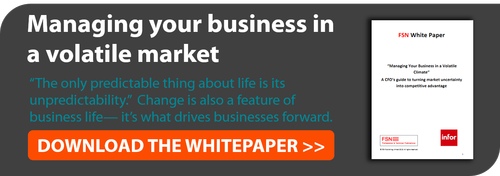In our last post on how to manage your business in a volatile climate, we mentioned that organisations can focus on measuring the right things, forecasting accurately and managing risks to its advantage and achieve their goals. In this articles, the second post of the series “Managing your business in a volatile climate”, we will discuss how new technologies can help businesses maintain their competitive advantages.
Nowadays, 3 key trends in digital business namely Big Data and Analytics, Digital Marketing, Social media tools and various delivery platforms such as cloud computing and mobility, are considered strategic priorities for business. As such, most C-level executives believe that these new technologies can help boost operating profits by 10%, according to McKinsey Global Survey: Minding your digital business. Additionally, a survey from FEI-Oracle webcast (August, 2012) report that mobile (46% of the ranking), cloud computing (33%) and Big Data (14%) are highly ranked by CFO in terms of bringing business value. Even though social media and networking are two key trends, CFOs are still sceptical about the social business (only 6% CFOs vote for these technologies). Let’s have a detailed look into each of these technologies and see how it can significantly shape the way companies operate and compete.

Cloud computing
There are some advantages that the cloud can bring to business which are understood by many CFOs such as the ability to yield responsibility for overseeing, managing, operating, and supporting the computing environment. Also, the cloud offers businesses a more malleable process coupled with scalability, flexibility and agility that gives them the ability to respond to market volatility. Nowadays, CFOs don’t view the cloud as a cost-saving platform any more. In contrast, the cloud can bring strategic benefits. For example, it help businesses get critical growth initiative up and running quickly regardless of whether they use the cloud to quickly upgrade to a new application, or simply use it to deliver new mobile or analytical capabilities.
Big Data
Big Data is not an entirely new term. CFOs are accustomed to dealing with increasing volumes of information. However, Big Data has become more unique and urgent due to four main reasons:
- First, there is a widening gap between the opportunities afforded by Big Data and the companies’ capability to exploit them.
- Second, there are unprecedented volatility and continuous change in the economic, regulatory and market that leads to intense interest in the technologies and technique that help analysing market trends quickly to stay ahead of competitors
- Third, having big success in retail, healthcare, and financial services sectors, Big Data is believed by some market observers to be the catalyst for entirely new growth opportunities, products, and services
- Last, there is an intense shortage of personnel with deep analytical skills who can leverage the full value from Big Data initiatives
Social media
Initially, social media are only used to accelerate, broaden brand awareness and crowd-sourcing. Nowadays, businesses use social tools to enhance collaboration, knowledge sharing, and crowd-source innovation. There are cutting-edge systems that allow social business capability where information is shared and conversations are organized into streams across the organisation. Staff can save time searching for the documents, discussions, and details that matter most, and gain the security provided by traceable communication. In turn, it changes the way that individuals work and help businesses respond more rapidly to change and volatility.
Mobile computing
According to a CFO Magazine survey in Jun 2012, 89% of CFOs rank mobility as the number one technology of importance to their company’s success over the next three years. Reasons are, mobile technology allows to retrieve information from corporate system in real time, in any way and anywhere on decision makers’ mobile device where decisions can be made immediately. Additionally, mobile device is no longer seen as the endpoint of an information flow, yet it can be equally considered a data generation point that use location specific information and images to enrich corporate data on people, customers, suppliers, products and personnel. Thus, mobile technology will be the key to smarter and faster business decisions which, in turn, brings productivity gains and business agility in a challenging volatile economy
In summary, businesses not only have to define and rightly measure own KPIs, perform more frequent and accurate forecasting, and manage risk effectively, but also they should leverage new technologies namely Big Data and Analytics, cloud computing, social media and mobile technology to maintain competitive advantages and thrive in a volatile market.
Read the whitepaper “Managing your business in a volatile climate: A CFO’s guide to turning market uncertainty into competitive advantage” for a more detailed discussion on these technologies and figure out how you can leverage them to maintain competitive advantages for your business.
 English
English  Vietnamese
Vietnamese 

